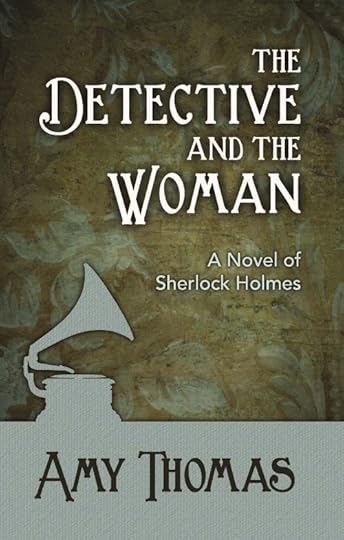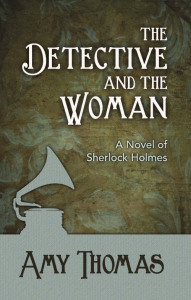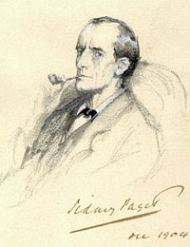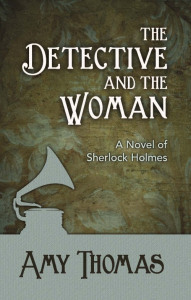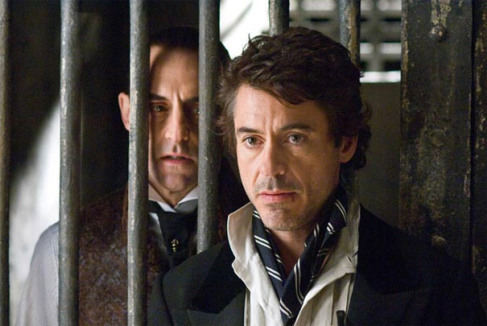Amy Thomas's Blog, page 14
November 1, 2012
Canon Thursday: Why Pastiche?
Yesterday marked a milestone for me, the conclusion of the first draft of my second novel starring Sherlock Holmes and the indomitable Irene Adler. MX Publishing has given me the greenlight, and I’ll be getting it ready for publication.
Possibly as a result of this, I’ve been thinking for the past few days about why it is that we write Sherlock Holmes pastiche. (For the purposes of this post, a pastiche is any work that stars Sherlock Holmes that was not written by Sir Arthur Conan Doyle).
The canon itself is not exactly short. Conan Doyle was prolific, and fans have fifty-six short stories and four novels to sink their teeth into. And yet, people have been writing Holmes pastiche ever since the detective was created, and in today’s Internet-focused world, we see more and more fanfiction, or pastiche that is published for entertainment rather than profit. (Yes, I believe that in many cases, this is one of the only major differences between fanfiction and pastiche.)
Pastiche, of course, is not only a Holmesian phenomenon. Numerous sequels to Pride and Prejudice exist, and Scartlett, the fan-written sequel to Gone with the Wind is regarded by some as a modern classic, to name a couple of examples. In these cases and others, however, readers seem to be responding to the brevity of the source material. Margaret Mitchell only gave us one book about Scarlett O’Hara, and Jane Austen only wrote about Mr. Darcy one time. Holmes, on the other hand, stars in story after story.
In my view, it’s not so different. Sir Arthur gave us many stories about Holmes, but told us very little about the private man. What we learn, we glean between and around and under the lines, trying to grasp whatever morsels we can find. The short story format, in particular, facilitated this, each tale providing just enough room for a case, with personal details wedged in here and there.
Though ACD wrote much more extensively about Holmes than Jane Austen did about Elizabeth Bennett, there’s still such a lot we don’t know about him. It seems, as we read, that our minds are always wanting to move outward, to know more about the personal side of the detective and his world and more about the tantalizing details the author only wafted in front of us, such as the immense intrigue of Mycroft Holmes, a character so fascinating in his brief canonical appearances that entire books have been written about him.
The reason I write about Sherlock Holmes, which I believe I share with others, is the need to know more about him, whether about his work or his character or his world. ACD revealed just enough to keep us hooked, but never quite enough to make some us feel satisfied with the amount of Holmes we have. That’s why I pastiche.
How about you?
The Detective and The Woman: A Novel of Sherlock Holmes is available through Amazon, Amazon UK, and The Book Depository (free shipping worldwide).


October 18, 2012
Thursday Special: Book Signing
For any of you in the Fort Myers area, I will be at Barnes and Noble on US 41 in Fort Myers on Saturday, October 20th to sign copies of The Detective and The Woman: A Novel of Sherlock Holmes from 1-3pm. Come by and say hello!


October 6, 2012
Reduced Price: The Detective and The Woman
For reasons unknown, Amazon.com is currently offering The Detective and The Woman: A Novel of Sherlock Holmes at an extremely reduced rate. Click here to get it!
Irene Adler, American opera singer and the one woman who outsmarted Sherlock Holmes, finds herself a widow at thirty-two, wealthy but emotionally broken. At the same time, Sherlock Holmes finds himself unable to return to England after faking his death at Reichenbach Falls and is drawn into an investigation of two men with designs on a woman they call Miss A, who is none other than Irene Adler herself. The Detective and The Woman throw their lot in together to uncover a dangerous plot with implications that stretch across the Atlantic. In the process, they meet legendary inventor Thomas Edison and experience life in Florida at the turn of the 20th century.


October 5, 2012
TV Interview Fun
This week, I had a chance to appear on the Fox 4 Morning Blend TV show to talk about my novel The Detective and The Woman, as well as the continuing popularity of Sherlock Holmes and the amazing Baker Street Babes.
Click here to see the segment!
The Detective and The Woman is available at mxpublishing.com, mxpublishing.co.uk. amazon.com, amazon.co.uk, Kobo, Book Depository (free shipping worldwide), and barnesandnoble.com


October 4, 2012
Canon Thursday: My First Sherlock
Den of Geek posted this enjoyable article today about a movie called “Young Sherlock Holmes” that came out in 1985, which was the year of my birth. I didn’t see the film until more than ten years later, when my sister discovered it during her high school years.
Thinking back, I saw “Young Sherlock Holmes” soon after meeting the detective for the first time through the original stories. Properly speaking, my first Holmes was the one in my imagination when I read, but my first on-screen version of the detective was Nicholas Rowe, who played a teenaged Sherlock Holmes.
“Young Sherlock Holmes” is an alternate universe take on Holmes in which Holmes is sent to boarding school and meets John Watson, who turns out to be a loyal, if thick, best friend. Holmes also comes into contact with a girl named Elizabeth, who inspires him.
This movie isn’t quite a classic. It fails to fully execute a very promising idea, and it has weaknesses throughout. At the same time, there’s something about it. Maybe it’s because I saw it at such a young age, but there was an originality that grabbed me in an unusual way. In retrospect, I think that was mostly a result of Nicholas Rowe’s Holmes. In spite of the script being far afield from the original stories, Rowe’s performance is surprisingly canonical. His character develops through the story until the very end, when glimpses of the authoritative adult Sherlock Holmes become apparent.
According to Den of Geek, “Young Sherlock Holmes” was intended to be a franchise but didn’t perform well enough for that to happen. I like it the way it is, with the viewer leaving Holmes right at the beginning of his career and with a parting shot of a professor whose name just happens to begin with M.
I recommend checking out “Young Sherlock Holmes” if you enjoy taking in different versions of the detective (though not if you’re a strict purist). It’s a fun movie to watch, and I still have a little place in my heart that belongs to Sherlock Holmes as portrayed by Nicholas Rowe.
Who was your first onscreen Sherlock Holmes?


September 20, 2012
Canon Thursday: Sherlock Holmes’s Worst Day
I’m having what can only be described as an abysmal day at work. This led me to wonder:
What is Holmes’s very worst day in the canon?
There are several possibilities, of course. I’m inclined to pick the day Holmes learns that he has lost his client in “The Five Orange Pips.” His realization of his mistake in “The Adventure of the Yellow Face” is another contender, though he seems to take that one in stride pretty well. To me, days of failure are some of the best contenders for Holmes’s “worst” because he hates to be wrong, but there are certainly other possible perspectives.
What do you think? What is Sherlock Holmes’s worst day ever? Let me know in the comments.


September 17, 2012
Book Review: No Police Like Holmes
No Police Like Holmes
By Dan Andriacco
Reviewed by Amy Thomas
The Baker Street Babes
Some Sherlock Holmes enthusiasts take life very, very seriously. Author Dan Andriacco is not one of these people. His novel No Police Like Holmes is a wickedly funny satire of the modern Sherlockian world and an engaging mystery as well.
The story opens with a hilariously motley collection of Holmes-obsessed individuals who can’t wait for a glimpse of rare Holmesian artifacts, and it goes on to romp through theft, murder, and irrepressible Sherlockian humor.
Andriacco’s characterizations are particularly charming, and his two sleuths—the cynical Jeff Cody and expansively gregarious Sebastian McCabe—are both the odd couple and oddly suited to each other, as different as Holmes and Watson, but in the end, just as essential to each another.
No Police Like Holmes is a chocolate bar of a novel—delicious, addictive, and leaves a craving for more. Holmesians of all tastes and ages will recognize themselves in Andriacco’s characters and enjoy his fast-paced plot. Thankfully, the series continues, and fans can satiate their desire for more with Andriacco’s next novel, Holmes Sweet Holmes.
Buy it at the Baker Street Babes Bookshop
*This book was provided for consideration by MX Publishing.


September 13, 2012
Canon Thursday: Minor Characters
If you had to come up with a story starring a character from the Holmes canon who isn’t Holmes or Watson, whom would you pick and why?
My first answer to this question is Irene Adler, and I’ve done it by writing books that are half in her voice. I’ve also written one short story from Mrs. Hudson’s perspective, and I’d love to explore her character more.
How about you?
___
The Detective and The Woman: A Novel of Sherlock Holmes is available through Amazon , Amazon UK, Kindle, The Book Depository (free shipping worldwide), Barnes and Noble, and MX Publishing.


September 3, 2012
Omnimystery Review: The Detective and The Woman
There are a number of clever elements to The Detective and the Woman, not the least of which is the time frame in which the action take place. The setting — turn of the century southwestern Florida — is well drawn and seems perfectly suited to the mystery storyline.
Click here to read the rest of Omnimystery’s thoughtful review of The Detective and The Woman: A Novel of Sherlock Holmes.


August 30, 2012
Canon Thursday: Out of Character, My Dear Holmes
Canon Thursday usually plumbs the depths of what makes Holmes Holmes. We’ve discussed the most quintessential moments of Holmes and Watson, the best examples of stories and novels, and the greatest quotes.
This week, I want to know if you think Holmes ever does anything genuinely out of character in the canon. Of course, this question is irrelevant if you always play The Game (individuals who choose to treat Holmes as real). Sometimes I play The Game, but not always. I also like to look at the stories as literary works, and this is one of those times. If the canon is a group of literary works, then idea of in-characterness is one of internal authorial consistency.
My answer to the question, rather than being a particular instance in the canon, is the whole idea of Holmes being the writer of any of his own stories (“Blanched Soldier” and “Lion’s Mane”). In my personal opinion, it’s quite silly to have Holmes grouse for years about Watson writing his cases down and show nearly zero interest in having a written record of them, only to turn around and go for it himself. I think I can sort of understand the appeal for Conan Doyle, who probably really wanted to try something new, but it just doesn’t work for me. Even if the stories are perfectly Holmes’s in voice (arguably not entirely true, in my view), the very idea that the detective wrote them doesn’t work for me.
The way I get around this, if I want to go full circle and back to playing The Game, is to assume that Watson wrote the stories and acted as if Holmes did. I also enjoy the way Laurie R. King dealt with the issue in her Mary Russell pastiche series, which was to have Holmes furious because the publisher of the stories had acted as if he’d written them when he hadn’t (which, for me, is a far more in-character response than genuinely writing them himself).
What do you think? Am I off-base? What is your pick for an out-of-character moment, or would you argue that Holmes is a totally consistent character? Let me know in the comments




